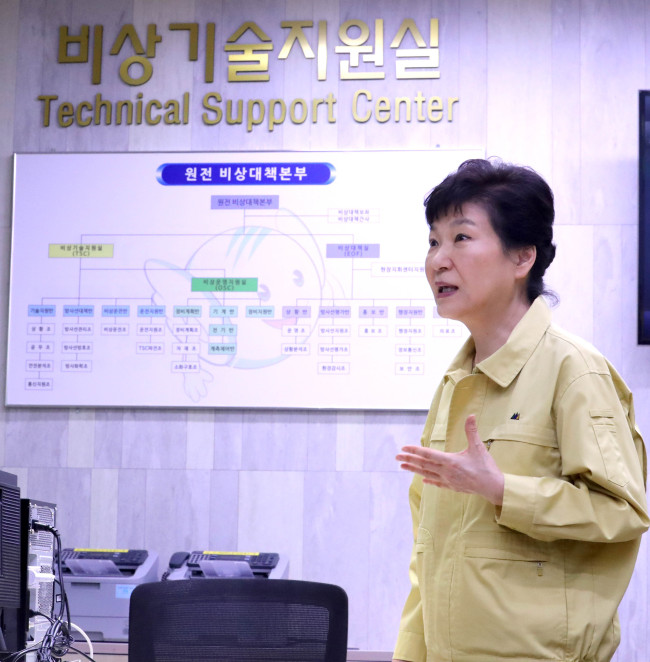President Park Geun-hye on Tuesday called for a review to designate Gyeongju as a special disaster zone after the city was hit by the country's strongest earthquake on record last week and hundreds of weaker tremors afterwards.
During her visit to the city 371 kilometers southeast of Seoul, Park also called on her government to mobilize "all of its administrative capacity" to review how to better prepare the nation against future temblors "from square one."
"Please consider the option of declaring Gyeongju as a special disaster zone," the chief executive told her aides during her visit to a quake-hit area of the city.
If the city is designated as a disaster area it will receive emergency relief and special administrative and financial support from the government.
During her trip to the city, Park met with anxious residents and then visited the Wolseong Nuclear Power Plant which has shut down its four reactors temporarily following the quakes last week.
 |
Park speaks at the Wolseong Nuclear Power Plant's technical support center on Tuesday. (Yonhap News) |
"As it has been confirmed that our country is no longer safe from quakes, (the government) will review the overall response system and craft thorough measures (to deal with future temblors)," she added.
Speaking with officials at the nuclear power plant, Park pointed out that the "national task" at this point is to determine how to protect the nuclear facilities from an earthquake with a magnitude exceeding 6.5. The Wolseong reactors have been built to withstand a 6.5 magnitude quake.
"It would be difficult for any human being to be perfectly prepared against all possible disasters," she said. "But shouldn't we keep trying to enhance the completeness (of our preventive measures)?"
On Sept. 12, Gyeongju was hit by two quakes, one of which registered magnitude 5.8, the strongest to hit the Korean Peninsula to date. The city and its vicinity have since been buffeted by hundreds of smaller aftershocks, with a 4.5 quake hitting the city again on Monday.
No serious injuries have been reported, but many residents have been suffering from anxiety, which experts say could develop into post-traumatic stress disorder if not properly treated.
In terms of property damage, the latest quakes damaged the roofs of some traditional houses, called hanok, which Gyeongju -- the ancient capital of the Silla Dynasty (57 B.C. - 935 A.D.) -- has been striving to keep intact as a key tourism asset. (Yonhap)






![[Today’s K-pop] Blackpink’s Jennie, Lisa invited to Coachella as solo acts](http://res.heraldm.com/phpwas/restmb_idxmake.php?idx=644&simg=/content/image/2024/11/21/20241121050099_0.jpg)
